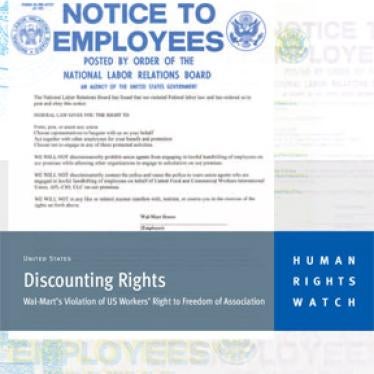Wal-Mart’s relentless exploitation of weak US labor laws thwarts union formation and violates the rights of its US workers, Human Rights Watch said in a new report released today.
In the 210-page report, “Discounting Rights: Wal-Mart’s Violation of US Workers’ Right to Freedom of Association,” Human Rights Watch found that while many American companies use weak US laws to stop workers from organizing, the retail giant stands out for the sheer magnitude and aggressiveness of its anti-union apparatus. Many of its anti-union tactics are lawful in the United States, though they combine to undermine workers’ rights. Others run afoul of soft US laws.
“Wal-Mart workers have virtually no chance to organize because they’re up against unfair US labor laws and a giant company that will do just about anything to keep unions out,” said Carol Pier, senior researcher on labor rights and trade for Human Rights Watch. “That one-two punch devastates workers’ right to form and join unions.”
As the world’s largest company, Wal-Mart’s conduct is especially troubling. Wal-Mart had $351.14 billion in revenue and $11.3 billion in profits in the fiscal year ending January 2007. It is the largest private US employer, with more than 1.3 million US workers and close to 4,000 stores nationwide. None of those workers is represented by a union. Human Rights Watch found that this is no accident.
Human Rights Watch’s investigation revealed that, in most cases, Wal-Mart begins to indoctrinate workers and managers to oppose unions from the moment they are hired. Managers receive explicit instructions on keeping out unions, many of which are found in the company’s “Manager’s Toolbox,” a self-described guide to managers on “how to remain union free in the event union organizers choose your facility as their next target.”
If workers try to organize, store managers must report it to Wal-Mart’s Union Hotline at headquarters. The company responds by sending out its Labor Relations Team almost immediately to squash the organizing effort.
Most of the Labor Relations Team’s tactics comport with weak US law. Team members hold small- and large-group “captive audience” meetings, which workers are strongly urged to attend. Workers hear of the terrible consequences of union formation and see videos dramatizing the message. Wal-Mart envelops workers with its anti-union mantra and allows little space for union supporters and organizers to respond – under US law, it does not have to.
“Employers can make their anti-union case loud and clear in the workplace, while banning union reps from company property,” said Pier. “That’s hardly a free and democratic election climate, and it would be unfair in any political contest.”
Wal-Mart’s relentless anti-union drumbeat creates a climate of fear at its US stores. Many workers are convinced that they will suffer dire consequences if they form a union, in part because they do not hear pro-union views. Many are also afraid that if they defy their powerful employer by organizing, they could face retaliation, even firing.
Human Rights Watch found that Wal-Mart heightens this fear with its arsenal of unlawful anti-union tactics. Wal-Mart has sent managers to eavesdrop on employees. According to former workers and managers at one store, it has even ordered the repositioning of surveillance cameras to monitor union supporters. It has told workers they will lose benefits if they organize. The company has discriminatorily banned talk about unions and prohibited union flyer distribution, while allowing discussion of other issues and circulation of non-union materials. It has disciplined union supporters for policy violations that it has let slide for union opponents. And it has illegally fired workers for their union activity.
Penalties under US labor law are so minimal that they have little deterrent effect, and Wal-Mart only receives a slap on the wrist when found guilty of illegal conduct. In most cases, offending employers must simply post in-store notices promising to abide by the law in the future and must restore the status quo before the illegal acts, for example by rehiring wrongfully fired workers and paying them lost earnings. They face no fines or punitive sanctions.
Denied the right to form unions, Wal-Mart workers have been unable to join forces to raise their concerns that the company may be forcing out long-term employees, address their struggles to make ends meet on Wal-Mart wages, or call for an end to high healthcare costs.
A key way to improve protections for worker organizing would be for the US Congress to pass the Employee Free Choice Act (EFCA) and the Bush administration to sign it into law. The EFCA, which passed the US House of Representatives in March and is now under consideration in the Senate, would increase penalties for labor law violations. And it would help restore a democratic union selection process by requiring employers to recognize a union if a majority of workers signs cards showing their support. Currently, employers can force union elections and then intimidate workers with their aggressive anti-union message during the campaign period.
Human Rights Watch also urged the National Labor Relations Board, charged with enforcing US labor law, to seek more court injunctions when allegations of serious employer misconduct arise, particularly against repeat offenders such as Wal-Mart.
Human Rights Watch called upon Wal-Mart to cease all tactics, both legal and illegal, that undercut workers’ right to organize and to go a step further as an industry leader and pledge neutrality on union formation.
For its report, Human Rights Watch interviewed 41 current and former Wal-Mart workers and managers from US stores where organizing had occurred since 2000. Some supported the union; some were opposed; others were ambivalent. Human Rights Watch also contacted Wal-Mart three times in writing to request meetings and obtain the company’s views. Wal-Mart refused to meet and provided only very limited responses.
“Wal-Mart should change its anti-union behavior,” said Pier. “When companies like Wal-Mart can regularly violate US workers’ right to organize, they threaten a fundamental right and one that the government is duty-bound to uphold.”







